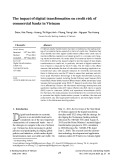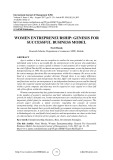
JSTPM Vol 13, No 3+4, 2024 29
DEVELOPING DIGITAL HUMAN RESOURCES IN THE
EUROPEAN UNION AND IMPLICATIONS FOR VIETNAM
Trinh Thanh Vinh
1
Institute for European Studies
Summary:
The article analyzes the development of digital human resources in the European Union
(EU) and suggests solutions for Vietnam. In the context of global digital transformation, the
EU has developed many policies and strategies to improve digital skills for the workforce,
from basic to advanced skills. The article also points out the major challenges that the EU
faces, including the gap in digital skills, difficulties in retraining workers, and gender
inequality in the technology sector. Based on the lessons of the EU, the author offers some
suggestions for Vietnam on building a digital skills development strategy, promoting public-
private partnerships, and narrowing the skills gap between regions.
Keywords: Digital human resources; Digital skills; Digital transformation; Vietnam;
Europe.
Code: 24101501
1. Introduction to digital human resource development in the EU
Digital human resources are the workforce with the ability, skills, and
knowledge to use digital technology to perform tasks, jobs, and business
activities in a digital environment. This concept is not limited to those
working in the information technology industry. Still, it extends to all sectors,
from manufacturing, healthcare, and education to finance and management,
where digital skills are becoming essential. Digital human resources possess
outstanding characteristics such as digital proficiency, the ability to think and
make decisions based on data analysis and digital processes, and the ability
to flexibly adapt to continuous technological change. In addition, they can
also work remotely and collaborate effectively online, which is especially
important in the context of increasingly flexible working (World Economic
Forum, 2020).
According to the OECD, digital human resources are the workforce that
possesses the necessary digital skills and knowledge to use and develop
technologies in the context of the digital economy. The OECD emphasizes
that digital human resources are not limited to the information technology
industry but extend to all economic sectors, where digital skills become an
1
Author’s contact: vinh82eu@gmail.com

30 Developing digital human resources in the EU and implications for Vietnam
important factor in improving productivity and work efficiency (OECD,
2019).
As for the EU, digital human resources are the workforce that can use digital
technology to increase productivity and competitiveness in the digital
environment. The EU focuses on the role of digital education and training in
building a workforce that can meet the needs of the digital economy and
contribute to the development of the digital society in Europe (European
Commission, 2020).
The characteristics of digital human resources are that they are outstanding
groups of workers with enhanced adaptability and efficiency in the digital
economic environment. First, this group has proficient digital skills,
including the use of basic software, digital tools, and complex technologies
such as programming, big data analysis, and artificial intelligence (AI).
These skills help solve their work quickly and optimize processes thanks to
the application of modern technology. Digital thinking is a core factor,
allowing digital human resources to make decisions based on data analysis
rather than subjective experience. In addition, the ability to adapt and learn
quickly is an important advantage. With ever-changing technology, they can
continuously update new knowledge and promptly meet work requirements,
promoting the digital transformation process in the organization. The ability
to work remotely and collaborate online also gives them flexibility in space
and time, using digital platforms to work effectively with colleagues
wherever they are. Finally, the spirit of innovation and creativity helps them
improve processes, enhance the quality of service, and create new value for
the organization. These characteristics help digital human resources promote
digital transformation and enhance competitiveness and sustainable
development for businesses.
Therefore, digital human resources play an important role in promoting
digital transformation, developing the digital economy, and building a digital
society. In digital transformation, digital human resources are the main force
carrying out digitalization and automation activities, from applying
technology to restructuring work processes. The digital skills and thinking of
these human resources help organizations optimize operational efficiency,
improve product and service quality, and create competitive advantages in
the digital market. In the field of digital economy, digital human resources
are the core factor in applying technology to develop new business models,
promote e-commerce, and create digital products and services. Thanks to the
ability to analyze and exploit big data, it contributes to developing accurate
business strategies, quickly meeting customer needs, and expanding the
market. This not only brings higher profits to businesses but also promotes
sustainable economic development. In a digital society, digital human
resources contribute to building systems that connect, manage, and distribute
online public services, from healthcare and education to public

JSTPM Vol 13, No 3+4, 2024 31
administration. They not only play a role in implementing technological
solutions but also educate the community on how to use technology
effectively, helping to create a more inclusive, equitable, and convenient
digital society for everyone. These contributions help improve the quality of
life and promote social development in the digital age (World Economic
Forum, 2020).
In the EU's strategy to promote economic and social development as well as
maintain global competitiveness, developing digital human resources is one
of the important issues. This also helps improve production processes, reduce
costs, and develop new products and services for companies. On the social
side, digital skills will narrow the gap between workers, increase access to
information and services, and contribute to promoting social equality. Digital
technology is playing an increasingly important role in everyday life, from
education, and remote working to healthcare. The EU is in direct competition
with technology superpowers such as the United States and China.
Developing a digital workforce will not only help the EU maintain its
competitive position, but also enable European businesses to lead in new
areas such as artificial intelligence, robotics, and big data. These fields are
considered the main drivers of the global digital economy and will determine
the position of countries in the future.
Currently, the EU is facing many challenges in developing its digital
workforce, especially the lack of digital skills among member states and
different population groups. This shows a large gap in digital skills between
member states, especially between the Nordic countries and Southern and
Eastern European countries, where the proportion of people with digital skills
is still very low. In addition, the shortage of highly skilled workers in
advanced technology areas such as AI, cybersecurity, and big data is a serious
problem. This situation not only affects the competitiveness of businesses but
also hinders the digital transformation process of the entire region.
Overall, the EU has made great progress in developing digital human
resources, but more efforts are needed to narrow the digital skills gap
between countries and population groups. This requires strong investment in
education and training, as well as appropriate support policies to create a
digital workforce strong enough to meet the challenges of the future.
2. EU policies and strategies on digital human resource development
The EU has been implementing many important policies and strategies to
deal with the challenge of developing digital human resources in the context
of global digital transformation.
First, the EU Digital Skills Agenda was developed as part of the Digital
Decade Strategy 2030 to meet the growing demand for digital skills. This
Agenda program aims to train and improve digital skills for 80% of EU

32 Developing digital human resources in the EU and implications for Vietnam
citizens and create 20 million Information and Communication Technology
(ICT) professionals by 2030 (European Commission, 2022). This program
focuses on training the necessary digital skills, from basic to advanced skills,
to promote the participation of workers in advanced digital technology
industries.
Second, the Digital Skills and Jobs Coalition is an EU initiative to create a
network of cooperation between governments, businesses, and educational
institutions to improve digital skills. The Coalition acts as a common
platform for parties to exchange ideas, implement training programs, and
reduce digital skills shortages. In particular, the Coalition has implemented
many practical projects such as the Digital Opportunity Traineeship program,
which allows students and young workers to access internship opportunities
in digital fields.
Third, the European Social Fund (ESF) is one of the EU's largest financial
institutions, established in 1957. The European Social Fund supports human
resource development and addresses labor market challenges. From 2021 to
2027, the European Social Fund Plus (ESF+) allocates EUR 99.3 billion, a
large part of which is invested in developing digital skills for citizens,
especially those at risk of being excluded from the labor market due to lack
of skills. The projects supported by ESF+ often focus on reskilling and
upskilling of existing workers, especially those in traditional occupations that
are affected by digital transformation (European Commission).
Fourth, Horizon Europe is the EU’s flagship research and innovation
program. Horizon Europe, with a budget of EUR 95.5 billion from 2021 to
2027, has made an important contribution to the development of advanced
technologies such as artificial intelligence (AI), cybersecurity, and Big Data.
Part of Horizon Europe’s budget is allocated to digital skills research and
development projects, aiming to create new technological solutions and train
a highly skilled workforce (European Union, 2024).
Fifth, the Digital Europe Programme is a EUR 7.6 billion program to directly
finance innovation projects related to digital skills, including the
development of advanced skills such as AI, cybersecurity, and high-
performance computing. This program not only helps to promote
technological development but also provides training for millions of workers.
Sixth, universities and educational institutions. Many universities and
vocational training centers in the EU have been actively involved in
providing digital courses and training programs. Universities not only teach
basic computer science subjects but also partner with technology companies
to provide in-depth courses in AI, big data, and cybersecurity. One example
of that is the cooperation between universities and large companies such as
Google or Microsoft in developing practical training programs to improve
students' digital skills.

JSTPM Vol 13, No 3+4, 2024 33
Seventh, Internship and vocational training programs. Programs such as the
Digital Opportunity Traineeship have been implemented to provide
internship and digital skills training opportunities for thousands of students
and young workers. This not only helps them gain practical experience but
also improves their employability in the digital technology sector. Vocational
training centers also play an important role in providing short courses and
digital skills training for adult workers.
Eighth, the role of EIT Digital. The EIT Digital Academy provides short
courses and internships for learners, giving them access to advanced
technology skills and hands-on experience with partner companies. It is a
prime example of public-private partnerships to develop a high-quality
digital workforce.
In summary, thanks to these strategies and programs, the EU is narrowing
the digital skills gap and promoting employment in the information
technology sector, laying the foundation for the development of the global
digital economy. Funding entities and programs have expanded opportunities
for people in member states to learn and develop digital skills, thereby
improving the capacity of the workforce. Cooperation between educational
institutions, businesses, and governments has built a strong educational
ecosystem, meeting the demand for digital skills, and enhancing Europe's
competitiveness in the international market.
3. Challenges in developing digital human resources in the EU
One of the biggest challenges in developing digital human resources in the
EU is the digital skills gap between member states. The Digital Economy and
Society Index (DESI) 2022 shows that Nordic countries such as Finland,
Sweden, and Denmark have nearly 80% of their citizens with basic digital
skills, while Southern European countries such as Greece, Italy, and Bulgaria
have less than 40%. For example, Romania and Bulgaria have only about 28-
31% of their citizens possessing basic digital skills (Jasper Spanjaart, 2023).
This disparity not only makes it difficult to implement digital initiatives
across the EU but also widens the economic development gap between
member states. Countries with low levels of digital skills often have difficulty
accessing the benefits of digital transformation, making them vulnerable to
falling behind in the global technological competition. In addition, many
Southern and Eastern European countries have difficulty providing the
digital infrastructure and training programs needed to upgrade the digital
skills of their workers.
The EU has recognized the importance of bridging the digital skills gap
between countries through programs such as the Digital Skills and Jobs
Coalition and the European Skills Agenda, which aim to support digitally
less developed member states in terms of technological capabilities and
workforce retraining. However, synchronization of strategies and funding


























